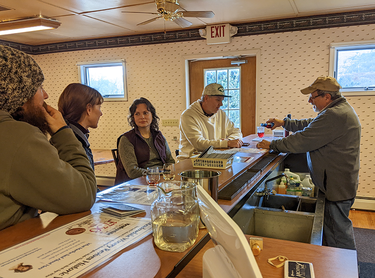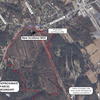Meadowdale Farm Winery pairs drinks with history
NEW SCOTLAND — Seven years ago, Meadowdale Farm Winery began out of an 18th-century barn on Fryer Lane. Now an award-winning winery, it has relocated to the similarly historic site of the former Picard’s Grove, in New Scotland, and soft-opened its newly expanded tasting room there this week.
Owner John Sheehan told The Enterprise this week that the room’s “general themes will be celebrations of local history and the natural wonders around the farm” — in keeping with the larger theme of the property itself, which is under a land conservancy following a quest to preserve what had long been a gathering space owned by the Picard family for generations.
The property was sold to Richard and Valerie Glover after Jeanne Picard Fish — the last of the Picards to own the property — was declared incapacitated in 2019. It was not an easy sale, requiring a judge to select the Glovers from two other hopefuls, including the developer Jeff Thomas, amid much local consternation about how the historic property would be altered.
The judge had selected the Glovers in light of Jeanne Picard Fish’s own hopes for the property. Under the Glovers’ ownership, the land came under a conservation easement managed by the Mohawk Hudson Land Conservancy.
Sheehan told The Enterprise that he hopes running a business out of the space he leases there will “help support the farm’s long-term conservation.”
“We read about the plans to develop the place into houses and were sad to hear about that,” Sheehan said of the original purchase agreement that had preceded the court’s intervention.
There were initially reservations about moving to a larger space, but eventually, the decision was made — though getting things up and running took longer than anticipated, he said, explaining that there’s an “incredible amount of federal, state, and local regulatory approvals and paperwork needed to move a wine manufacturing facility from one location to another.”
Fortunately, he said, “Rich and Val have had a sense of humor” about it.
“We had hoped to be ready in six weeks,” Sheehan said. “It took six months. Our former tasting room on Fryer Lane had been in a barn, so it was open only seasonally and really consisted of just a single room. The winery was in the farmhouse basement. Now, everything is under one roof, handicapped accessible and includes a nice, indoor restroom. We have a loading dock and overhead door to bring pallets and large items into the building, instead of hauling everything up and down stairs via a Bilco door.”
An old furnace took some time to boot up, having been off for seven years, he said, and the rest of the building is being renovated gradually with new railings and paint. A new gravel parking lot was created by Sheehan’s cousin, Austin Rivera, over three days.
“I am happy to report that he was among the first to tip a glass in the new tasting room,” Sheehan said.
Sheehan hopes that the environment enhances the tasting experience, and noted that many people stop to take photos of the property as they pass by, including a family dressed up for Halloween taking a family portrait.
“We hope this will be a place people come to relax and unwind, have a nice conversation and enjoy the bounty of the countryside,” he said. “It is a big space but has a cozy feel to it.”
Offerings
Although they don’t currently grow any fruits on the property — instead sourcing them locally elsewhere, usually from within a few miles — Sheehan said that Richard Glover had pointed out an area where they might be able to, so the family is “planning accordingly.” Meadowdale’s wines are made from apples, grapes, elderberries, and, unusually, birch sap.
Once popular in colonial America — it was an aperitif favored by Martha Washington — Sheehan said that birch wine is rarely produced commercially, and Meadowdale has become the first and only producer in the United States with federal approval to make it after Sheehan discovered a recipe by chance and experimenting with it.
“We found a local birch wine recipe in a book of local food recipes,” he said. “It was thrown in as an illustration of historic drinks of the region. The recipe was written down in 1736, which is not far from when the Dutch barn on Fryer Lane was built, so we had to give it a rip. We were stunned to find that we liked it. It is light and citrusy with a hint of juniper at the finish.”
The historic method of fermenting the wine was to spread baker’s yeast on wheat toast and “drop it all into the wine vat,” Sheehan said. “I am kind of a nut about sanitation, good chemistry, and careful measurements. That method seemed a little too random for me. We use wine yeast instead and get consistently excellent results.”
Sheehan said he knows they’re the first commercial producers of birch wine because the federal government “demanded” their formula, in disbelief that such a thing would even be possible after the tradition was apparently lost to history.
In addition to four kinds of apple wines, an elderberry wine, and a variety of grape wines — including one from a grape developed specifically for the Hudson Valley climate at Cornell University — Sheehan said that Meadowdale will eventually be selling apricot and pear wines.
But, don’t let the variety, nor any preconceptions about needing a sophisticated palate or broad base of knowledge about soil types, intimidate you.
“All you need to know when you visit Meadowdale Winery is what tastes good to you,” Sheehan said. “That is the only measure of wine that really matters.”
For all the medals they’ve won in international competitions, Sheehan said, “those mean nothing if you don't like it. I am very confident that anyone who visits will find something that suits their palate. We have a broad variety of styles and sweetness levels, from bone dry to sweet dessert wines.”
Provenance
Beyond the historicism that resonates from the Picard’s Grove property and the all-but-lost birch wine, Meadowdale connects to Sheehan’s personal history as well.
A second-generation Italian American, Sheehan grew up in an enormous family (with more than 200 Italian-American cousins in the greater Troy area, he noted), many of whom were amateur winemakers.
“All of my cousins’ fathers made wine in their homes as did my great uncle and his sons,” he said. “As a youngster, I felt very grown up when I was allowed to have a tiny glass when visiting around the holidays. But I was the youngest of six kids, so a lot of them were dead before I was old enough to help them and learn.”
Sheehan first tried his hand at brewing beer, but his wife, an attorney, “had an aversion to the smell of malt and hops throughout the house, especially while she was pregnant” with their daughter, Hannah, an environmental engineer.
“So, I shifted to making wine, which doesn't require boiling,” he said. “That was about 26 years ago. When the farm winery license became available, the low cost made it affordable to gamble on trying some commercial production. I had a friend” — Bernard Melewski — “with a farm who happened to like wine. We formed a partnership in 2016 and got our federal license on Leap Day.”
Melewski retired this March, and Sheehan took over all the operations, “new to handling both the winemaking and all of the business end,” he said, noting that he has help from his wife and daughter.
Now, with so much history on their side, he said, “Things are looking up.”


